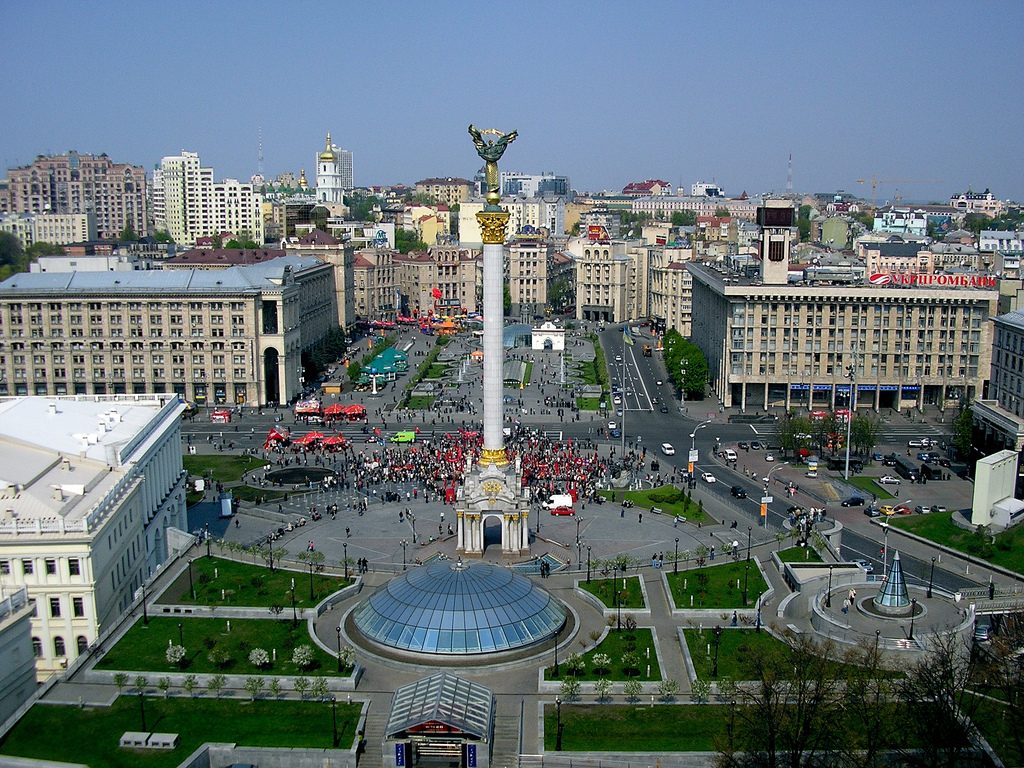
an update on safety concerns and educational opportunities
– February, 2015 –

SRAS carefully monitors events everywhere we have students. With continued developments in Eastern Ukraine and Russia, we’d like to provide an updated report on what effects those events may have on study abroad in general and on any students who are on the ground in Russia or Ukraine.
1. Study Inside Ukraine
Fighting in Ukraine’s eastern provinces continues. However, life inside Kiev, about 430 miles away from Donetsk, where the conflict is centered, has remained stable since the new government took over nearly a year ago. SRAS therefore continues its programs in Kiev. We are also maintaining our location in Batumi, Georgia as a backup should we need to relocate our Kiev programs quickly.
Kiev and Ukraine represent major geopolitically relevant issues of our day. Events there are driving the changing future of relations among members of the European Union, as well as among the US, Russia, the EU, NATO, and allies of those entities. Ukraine is also currently facing several unique challenges in its attempts to balance its energy, economic development, and monetary policy, seek needed international help, and regain the confidence of a large section of its own populace.
Kiev and Ukraine offer invaluable experience to students interested in building careers in diplomacy, government, or social science. In witnessing how relations change, how Ukraine faces its challenges, how events are covered in the local press, and especially in the ability to discuss these issues directly with the people of Ukraine, students will gain unique insight into how such challenging local and international events affect the common people of a country.
Inflation in Ukraine, currently at 25%, is a concern. However, while students may see prices rise while they are on the ground, they will likely find those expenses that most affect students – for food, public transportation, communications, and even sports clubs memberships – remain highly affordable by American standards. In fact, with Ukraine’s currency rapidly losing value against the dollar, prices may rise for Ukrainians, but for American students with dollar budgets, prices are actually likely to decrease overall.
SRAS believes the educational opportunities in Kiev are currently extraordinarily high. Any related risk is manageable with sustained monitoring, increased safety measures, prepping students beforehand with materials, and by maintaining backup plans.
2. Study Inside Russia
Economy
The recent drop in oil prices, combined with the effects of sanctions (both those enacted by Russia and by Western powers) have resulted in a sudden drop in value of the ruble against the dollar. As the Russian economy is import-heavy, this is now beginning to drive a sudden rise in inflation inside Russia.
Over the next months, prices in Russia will likely fluctuate, inflation will be substantial, and the departure and arrival of brands on and off the market will be rapid.
However, similarly to Ukraine, while students may see prices rise while they are on the ground, the loss of value of the ruble against the dollar greatly offsets this. Currently, living and travelling in Russia on a dollar budget is cheaper than it has been in more than a decade – and is about half the cost compared to a year ago. Thus, students are right now in a unique position to be able to watch how another culture deals with extraordinary economic change in their country – but while the students themselves are largely insulated from the negative effects of that change.
Also, inflation is likely to slow over the summer it is, in large part, being driven by food imports. In summer, dacha owners will probably devote large areas of their property to gardens, bringing prices back down somewhat, and investment into agriculture inside Russia is likely to go up with prices currently standing at record highs.
Many theorize that the economic situation might cause political ruptures in Russia. We still hold that this is still only a distant possibility. Russians have lived through a governmental collapse and three major economic crises in the last two decades. Before that – there was sizable period of stagnation. Looking at this and most of Russian history, actually, shows that for Russians, sustained prosperity is not something to be expected; economic stagnation or crisis is far more common, especially for average people. Most Russians currently say that they will simply buy less if things cost more. That’s what they did in the 1990s, and that’s what they plan to do now. Polls show that very few are ready to take to the streets and most, in fact, support the current government, even as the economy falters.
While perhaps surprising to many Americans, this is a historic norm for Russians. Experiencing this surprising and fascinating aspect of Russian culture should be of special interest to students of politics, sociology, diplomacy, and history.
Anti-Americanism
Polls have, for some time now, shown that the majority of Russians now consider their country a superpower and consider America an enemy. However, it is also true that Russians have traditionally separated their opinions of people from those of governments; A Russian who distrusts the American government is not likely to blame an individual American for the problems he/she believes that the American government has caused. We and our students still find that Russians are just as friendly towards and curious of Americans in their country – actively asking questions not only about politics, but also about culture, society, and economy. Russians still often seek out Americans as a friendly way to practice their English, which remains a very valuable skill for Russian professionals.
Students should be prepared to be asked by some Russians for their opinions on Ukraine and the sanctions. While most Russians still abide the general rule of courtesy that one does not talk about politics with people you have just met, Ukraine and sanctions are two issues that have become parts of daily life in Russia and are issues that many Russians care very strongly about. Thus, they will be interested in the opinion of an American concerning the actions of the American government. Students are encouraged to come with open minds and prepared to calmly describe any point of view they may hold. Students who do not wish to discuss these issues will generally find the issue defused if they answer that, for instance, they are not interested in politics and instead came to Russia to study the language or culture.
Sanctions and other Political Concerns
Wide-ranging sanctions against Russia by the United States would devastate study abroad to Russia as most US universities hold official policies of not supporting study abroad to sanctioned countries.
All parties, Russia, the EU, and the US have kept all sanctions imposed over the last year targeted at specific businesses, products, or individuals. The Obama Administration in particular has been vocally proud of the “sophistication” of the “surgical” sanctions. The sort of country-wide sanctions that would affect study abroad are not currently being seriously considered.
There are reasons to assume that sanctions will remain targeted. The US has typically counted the goodwill of the Russian people toward America (as an economic and cultural entity even when they disagree with American politics) as a diplomatic asset. Russia as well knows that the ability to travel the globe is one highly valued by Russians. Although the ruble’s loss of value is making this more difficult, moving to fully close the door would be highly unpopular in Russia and difficult to implement without greater bureaucracy, which Russia is currently seeking to cut as part of its badly-needed anti-crisis measures. Thus, neither Russia nor America is likely to impose sanctions that will directly prevent ordinary citizens from traveling.
One issue that does require monitoring is the recent discussion of barring Russia from the SWIFT banking system. This would be a “nuclear” option – it would end most ATM, cash card, and credit card transactions in Russia and would obviously cause a major problem for students and Russian consumers. It would also be outside the current paradigm. Current sanctions may be harming the Russian consumer – but are doing so by placing pressure on Russian liquidity and thus indirectly driving inflation. Cutting access to SWIFT would represent a direct, daily inconvenience to average Russians – a route that, so far, the western powers have avoided. Thus, while currently unlikely, the fact that it has gotten considerable press and considerable discussion from politicians makes it one to monitor and to include in contingency plans.
There has also been some concern lately about Russia’s reforms to its migration laws. As long-time observers of the Russia’s legislation and enforcement, however, we believe that recent changes can be seen as a continuation of 1) Russia’s long-term “reform” process, which has at least yearly changed procedures, sometimes simplifying and sometimes complicating them and 2) Russia’s increasing ability, largely through the digitization and integration of its systems, to enforce its migration rules. These migration laws have always been a top monitoring priority for us – but we have always found that carefully monitoring and following current procedures allows our students and clients safe and legal travel throughout Russia.
3. Conclusions
We believe that our locations in Russia and Ukraine are still safe places for study abroad and, in fact, with the national currencies falling and geopolitical profiles rising, study abroad in Russia and Ukraine is more affordable and more advisable than it has been in years. The ability to see how Russia and Ukraine and, more importantly, Russians and Ukrainians are currently handling dramatic economic crises, what life is like on the ground as the structure of the international world shifts, and to see how the populace are really reacting to events and government actions are all invaluable educational opportunities.
We will, as always, be monitoring the situations with the safety of students first and foremost in mind. We will also, as we often do, be attempting to prep students for the conversations and debates they may enter while on the ground with materials, seminars, and other efforts to help them understand the perspectives of locals.

